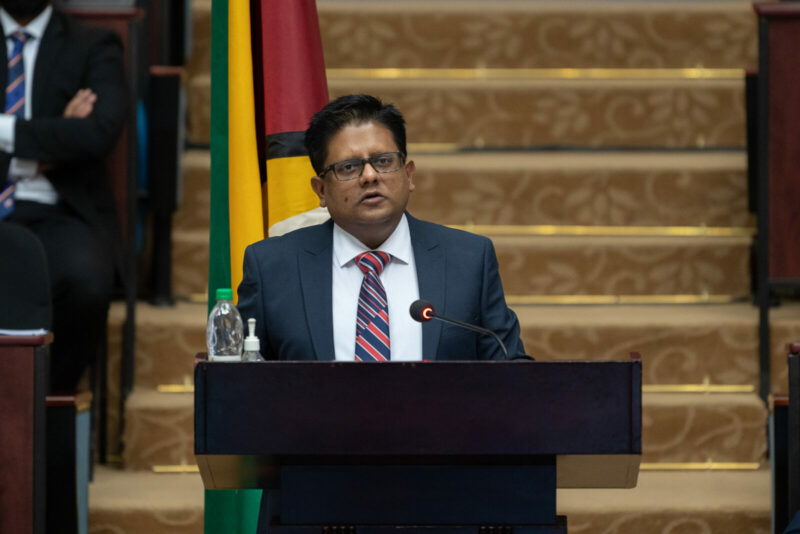Just after Venezuela concluded a referendum relating to Guyana’s Essequibo region, the United States (U.S.) has made it clear that the existing border controversy between the two South American nations cannot be settled through a referendum.
At a press briefing on Monday, Spokesperson for the U.S. Department of State, Matthew Miller reiterated his country’s support of a peaceful resolution of the controversy between the two states.
And he highlighted that the 1899 Arbitral Award, which established the land boundary between Guyana and Venezuela, “should be respected unless or until the parties come to a new agreement or a competent legal body decides otherwise.”
The International Court of Justice (ICJ), which is presiding over the substantive border case, ruled last Friday that Venezuela shall refrain from seeking to seize control of the Essequibo- a move many believed the Spanish-speaking nation would pursue following its referendum.
The boundary between Guyana and Venezuela was determined by an arbitration tribunal 124 years ago, but Venezuela rejected the award in 1962, saying it was flawed. A mechanism was set up to solve the controversy and after decades of talks failed, the United Nations Secretary General referred the matter to the ICJ, which is the UN’s principal judicial organ.
The court has determined it can hear and decide on the case, but Venezuela put forward the symbolic referendum before the Court can rule.
Guyana sought protection and that’s where the Court ruled Friday that the Essequibo has been recognised as Guyanese territory and has been governed by Guyana since the 1899 award and Venezuela should refrain from interrupting Guyanese sovereignty of the territory.
Venezuela still went ahead with its referendum although there are regional and international reports that there was low voter turnout.
Nevertheless, Mr. Miller said: “…We would urge Venezuela and Guyana to continue to seek a peaceful resolution of their dispute.
“This is not something that will be settled by a referendum.”
Guyana insists, as does the Caribbean Community (CARICOM), the Secretaries-General of the United Nations and Organization of American States, and the entire international community, that the controversy over the validity of the Arbitral Award and the land boundary must be resolved by the International Court of Justice, which will assure a just, peaceful, binding and permanent solution to this matter, in accordance with international law.
Guyana’s Vice President Dr. Bharrat Jagdeo, on Monday, told the News Room that Guyana is prepared for the worst, building defence cooperation with its allies, even though it does not believe that Venezuela’s President Nicolas Maduro will order an invasion of Guyana.
In a separate comment, Mr. Miller spoke about the U.S. intentions for sanctions relief in Venezuela. He, however, noted those haven’t gone forward since Venezuela hasn’t “gone through with their end of the bargain”.













It very welcoming to take note of this statement issued by The Department of State rubbishing Maduro’s Referendum on the border controversy suggesting that it has no basis in law to authorise Venezuela to undertake intrusions into the legitimate territory of Guyana and to establish the trimmings and trappings of a Venezuelan state in what is recognised globally as part of the territorial integrity of the state of Guyana for more than 123 years that is more than enough to validate the continuing link and sovereignty of Guyana and which is more than and comprise three quarters of its 83,000 square miles of landed patrimony and jurisdiction and exclusive control.
It appears that Maduro is hell bent on conducting an inhumane war of attrition to symbolise his rejection of both the ICJ’s competence and the Judgment issued on 1 December 2023.
This war in his opinion can salvage his dwindling hold on power in Caracas, harass and intimidate Guyana, deter foreign investments, divert resources in Guyana to military acquisitions rather than economic development, terrorise the population into fears and trembling and retard the frenetic pace of growth that will pose threat to Venezuela in the medium term.
This would appear to be Maduro’s last throw of the Essequibo dice because after this period his attempt to invade the Essequibo will be militarily impossible as his political fortunes begin to sag, wane, lose traction and The Opposition stages a renewed surge as the sanctions take roots and internal dissatisfaction rises to uncontrollable levels of discontent.
Maduro is grabbing at straws in his quest to stay politically relevant and resonate with the working class in the barrios.
Essequibo will prove to be his political waterloo and the albatross that sank him into oblivion.